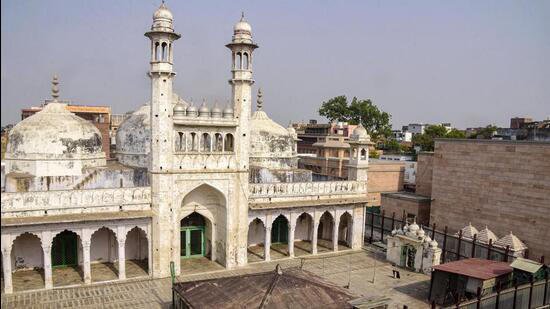The Allahabad High Court on Tuesday dismissed the pleas of Anjuman Intejamia Masjid Committee (AIMC), which manages Varanasi’s Gyanvapi Mosque, and Uttar Pradesh Sunni Central Waqf Board (UPSCWB) seeking restoration of a temple at the site. A civil lawsuit making the demand was challenged. Muslim place of worship adjacent to Vishwanath temple.
Justice Rohit Ranjan Aggarwal said that this case is not between two parties but is of national importance.
The order comes a day after the Archaeological Survey of India (ASI) filed a report in a sealed packet on the scientific survey of the mosque in the Varanasi district court on Monday. Hindu groups argue that the land on which the mosque was built after an ancient temple was demolished should be returned to Hindus.
Muslim groups have maintained the Places of Worship Act of 1991, which provides for the status quo existing in 1947 at holy sites except the Ram Janmabhoomi-Babri Masjid site, bars such arguments. Some of these petitions are also pending in the Supreme Court.
Justice Aggarwal said the suit filed in the Varanasi court was maintainable and did not violate the 1991 law. He directed that the case be decided preferably within six months. “No unnecessary adjournment will be granted…”
Gyanvapi case: Allahabad HC rejects mosque panel’s petitions
The court referred to the ASI report and said that if necessary, the lower court can direct the agency to conduct another survey.
On December 8, the High Court reserved its verdict on five petitions challenging the maintainability of a trial pending in a Varanasi court demanding the restoration of the temple.
The Varanasi court is hearing petitions by Hindu groups and individuals seeking the right to worship inside the mosque complex, claiming the presence of Hindu idols and deities within the complex adjacent to the Kashi Vishwanath temple.
The latest ASI survey was the second such controversial exercise in the complex. Hindu groups had claimed to find a Shivalinga there last year. The Muslim side says that the structure, which is claimed to be a Shivalinga, was part of a ritual bathing fountain. This area is sealed as per the order of the Supreme Court.
On July 21, Varanasi Court had directed ASI to conduct a comprehensive survey. On July 24, the mosque committee moved the Supreme Court against the order. The committee argued that it was not given sufficient time to challenge the order. The Supreme Court stayed the Varanasi court order till 5 pm on July 26, saying the petitioners should be given some “breathing time” to approach the high court.
The scientific survey of Gyanvapi Mosque resumed on 4 August amid tight security. The Allahabad High Court lifted the stay on August 3 and allowed the practice to go ahead.
On December 11, the court accepted the ASI’s plea and gave it one more week to file the report.
The Varanasi court’s decision ordering the survey came on two applications filed by four of the five Hindu litigants who had filed a suit in August 2021 seeking uninterrupted worship at the Maa Shringar Gauri site located inside the complex containing idols of Hindu deities. Rights were demanded. ,
The mosque management committee rejected the claim that the mosque was built over a temple, believing that the structure at that location had always been a mosque.
The Allahabad High Court had also last Thursday given permission for survey of the Shahi Idgah Mosque adjacent to the Krishna Janmabhoomi temple in Mathura.

